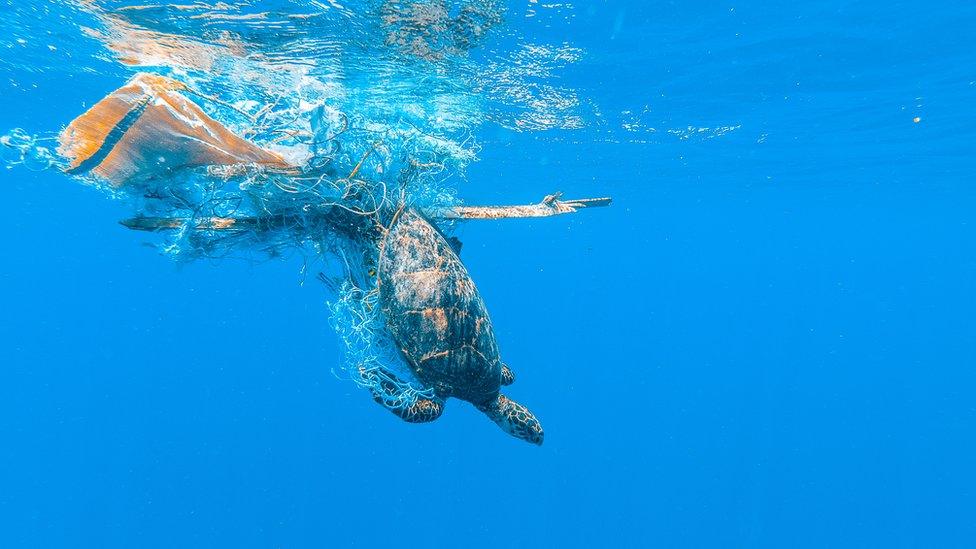Single-use plastics: Welsh ban 'may not be fully enforced until 2026'
- Published

The ban is intended to come into force in autumn 2023
Parts of a new Welsh law banning some single-use plastics may not be in full effect until 2026, a senior Senedd member has said.
The Welsh Parliament passed a law banning a range of items last week.
Some of them will be banned in autumn 2023 but other items - including on carrier bags - will be outlawed later to allow firms to use up stock.
The Welsh government has not given a date but Labour's Huw Irranca Davies suggested a delay until 2026.
It comes amid questions over whether the ban on bags needs UK government permission to be fully enforced.
That is because of a post-Brexit law that regulates how trade works between the UK's nations.
The Senedd's own research has questioned whether the ban is fully enforceable without an "exclusion" from the UK government.
The Welsh government insists the ban is fully enforceable despite the post-Brexit law, and has said it may be a test case for how the new framework, called the Internal Market Act (IMA), affects how the Welsh Parliament works.
Last week the Welsh Parliament passed a law banning a long list of plastic goods - including plates, cutlery, drinks stirrers, drinking straws and polystyrene cups.
The law also bans polystyrene takeaway food containers, plastic stemmed cotton buds and balloon sticks.
Wales was the last country in Great Britain to act on single use plastic, with England having banned stirrers, buds and straws and Scotland going further on sticks, cutlery, plates and polystyrene containers.
However the Welsh ban goes even further than both countries, prohibiting the supply of single-use carrier bags and oxo-degradable products.
Huw Irranca-Davies - a Labour Senedd member who is chair of the legislative committee of the Senedd - said that while the Welsh government said "the earliest some provisions can be commenced is autumn 2023, they have also explained that some provisions may be delayed until 2026 to ensure appropriate consultation and engagement".

The Welsh government said after regulations are brought in there will be bans from autumn 2023 on single-use plastic plates, cutlery, drink stirrers, plastic-stemmed cotton buds, balloon sticks and cups and takeaway food containers made of foamed polystyrene.
Bans for polystyrene lids for take-away cups and fast-food containers, plastic single use carrier bags and products made of oxo-degradable plastic will come into force at "a later stage to will allow more time for businesses to source alternative products and use up existing stock", it added.
What is the Internal Market Act?
According to Senedd research, external, the IMA has added uncertainty to whether the Welsh government can introduce effective bans on products permitted to be sold in other parts of the UK.
The IMA means that goods that can be sold in one nation of the UK should be able to be sold in another, despite what the law in the latter nation may say.
Welsh ministers had objected to the law because of the impact on the powers of the Senedd.
They have tried to get a court to accept their view that the way the IMA was written should not reduce the Welsh Parliament's powers.
Devolved governments can request an "exclusion" and most single-use plastics in the Welsh law are excluded from the IMA's rules, because of a request from the Scottish government earlier in 2022.
But two are not - single-use carrier bags, and what are known as oxo-degradable products.
Without the permission for the ban, the Senedd's research department suggests that a prohibition on single-use bags made in Wales would mean producers of bags in other UK nations would "retain an automatic right to sell these types of bags in Wales, or to supply them to Welsh businesses".
Danger of no 'accurate information'
In a report published earlier this year the Senedd legislative committee said there was "a danger that people and businesses affected in Wales are not being provided with accurate information about the effect of this legislation".
"This could result in individuals and businesses being unaware of, or misled about, the full extent of the law as it applies in Wales," the report said.
BBC Wales was told by a UK government source that the Welsh government has not requested its own exclusion.
The plastics law was put through the Welsh parliament quicker than laws normally are. The Welsh government said it did not want to "fall behind other countries in the UK".
But it also gave the reason that the law could be used in its own legal action against the Internal Market Act, after it was told it needed an example of a law for the Welsh government's arguments to be considered.
The Senedd committee argued that the IMA "could have been explored in greater depth" had the bill not been processed as fast as it was.

Huw Irranca-Davies said the Senedd legislative committee was "not satisfied" the Welsh government had clarified its position on the Internal Market Act.
He added: "The justifications used by ministers - and indeed the first minister - for seeking to fast-track the scrutiny of this bill seemed to evolve over time and under scrutiny, and sometimes became contradictory. That is not acceptable."
A Welsh Government spokesman said: "This Bill is well within the Senedd's competence and is fully enforceable and effective and [the IMA] cannot and does not cut across that devolved competence.
"We believe we have made this position clear and will continue to communicate this message with business and other interested parties over the coming months.
"The bill's timetable, while shorter in duration, allowed all the necessary steps for scrutiny to be completed.
"Following its passing in the Senedd, it will now enter the usual 4-week intimation period, during which either the counsel general or the attorney general may decide to refer it to the Supreme Court for a decision on legislative competence."
Related topics
- Published16 November 2022

- Published2 March 2022

- Published18 January 2022
